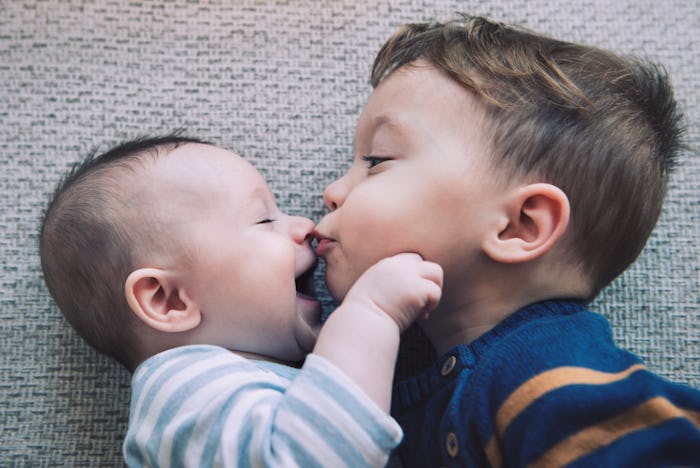Life

8 Signs Your Baby & Their Sibling Are Falling In Love
Welcoming another baby into your family is exciting, but for many second-time parents the excitement can be tempered with the fear that your baby and their sibling won't get along. You've had a baby before, sure, but not with an older child in the house! How's that going to go? Is your older child going to the new arrival? Is the baby going to like their sibling? And if the initial meeting goes off without a hitch, i there a way t tell if your baby is falling in love with their sibling?
This was a huge source of anxiety me. My son was, as many only-children are, the unquestioned center of my world the moment he entered it. Not that I didn't have a life outside of him, of course, but he was definitely my favorite part of it. I knew, deep down, that I'd certainly love this new baby as much as I loved her brother... but what if they didn't love each other? Was it going to be like that time in high school when my two best friends didn't speak to each other for a year, because that sucked.
Turns out I didn't have to worry — we somehow lucked out of the very typical "jealous phase" and, as we speak, my 5- and 7-year-old are playing upstairs together, giggling.
Clinical psychotherapist Kevon Owen explains that, in many cases, a growing love between siblings will come just from being around one another. "Familiarity is closely related to comfort," he tell Romper via email. "At very early ages you may not know who people are, but you know who is present in giving you love and attention. You can encourage recognition by allowing older siblings to be a part of attention and care."
Of course, that's not to say there won't be potential setbacks, either for the older or younger child.
"Look out for resentment from older siblings," Owen advise. "Resentment sets back endearment." As previously stated, a negative reaction to a younger sibling, especially early on, is quite common. This can create a negative reaction from a younger child.
But it's understandable, right? They're going through a very big life change with the introduction of a sibling, and they'll need your help adjusting to a new family dynamic. "Help [siblings] to endear themselves to each other by making sure to preserve their awareness of being loved. ... There is a shared awareness that needs to be taught," Owen says. "Older siblings need to learn to share... [but] they also need to have possessions and identity that is uniquely [for] them. Nurture this as well."
As your older child becomes more fond of the new arrival, you'll probably have some idea that things are going well for them. But what cues will your baby give you? Though it will be better if you are mindful of the process, all this can occur naturally, and sometimes earlier than you might think!
The Older Sibling Engages With Them
"At very early ages [babies] may not know who people are but [they] know who is present in giving [them] love and attention," Owen say. "You can encourage recognition by allowing older siblings to be a part of attention and care."
Look, we all know just how "helpful" children can be when it comes to infant care, but letting them "help" with their little sibling is going to go a long way in establishing a bond.
They're Making Eye Contact
It won't happen right away, and it will happen gradually, but making and maintaining eye contact is an important emotional milestone for infants. Making eye contact with a sibling indicates not only neurological growth but the growth of an important emotional relationship.
They Reach For Their Sibling
I mean... this is pretty self-explanatory, right?
The Older Sibling Likes Them
"As a generalized rule, people like people who like them," Owen says. "Believe it or not, young children and infants also fall into this categorization. They know if someone doesn’t like them."
Honestly, I'm 36 and if someone likes me I'm far more inclined to like them because, well, they clearly have good taste.
They "Talk" To Their Sibling
Who doesn't love some good baby babbling? I'm still not over that baby "having a conversation" with his dad, to be honest, and I don't think I ever will be. But learning the back-and-forth of a conversation with someone, even if you don't know how to talk yet, is another sign of brain development as well as bonding.
They Mimic Their Sibling
"Kids are enthralled with kids," Owen tell Romper. "Younger ones are fascinated by what those big kids are doing. This desire for connection will grow as awareness of the world around them grows. It starts with watching then mimicking then attaching/bonding."
You're Giving It Time
It takes time to fall in love with anyone, and it especially takes time when you're still learning to do literally everything. I mean, babies can't burp without assistance, so they're going to need your help learning to love as well. And a big part of this is getting everyone use to each other.
"Babies cry: let them. It’s good for older siblings to share that. Small kids play: let them. It’s good for babies to get used to the noise and sometimes startling nature of play," Owen says. "I once saw a 4-month-old baby who had a strong anxiety response to being around an 18-month-old baby because they were not used to the volume and energy. Neither child had an inappropriate response. However, exposure and time alleviates all this."
They Make This Face When They See Their Sibling
We all know what this face means, no matter who makes it. And when your baby reacts this way to their big brother or sister, it can only be love.
This article was originally published on